Ready to sculpt those biceps and build some serious upper arm strength? I’m sharing the best barbell exercises that will help you build muscle and get a satisfying bicep pump.
The best part? You can do these right in the comfort of your own home gym as well.
Let’s face it: who doesn’t want a bigger bicep? I know I’ve always loved that feeling of confidence that comes with filling out a t-shirt.
Plus, strong arms aren’t just about looks—they’re functional too, helping you with everyday tasks and making you feel like a powerhouse.
This comprehensive guide will discuss bicep anatomy, the best barbell exercises, and how to incorporate them into your bicep workout routine.
Let’s get started!
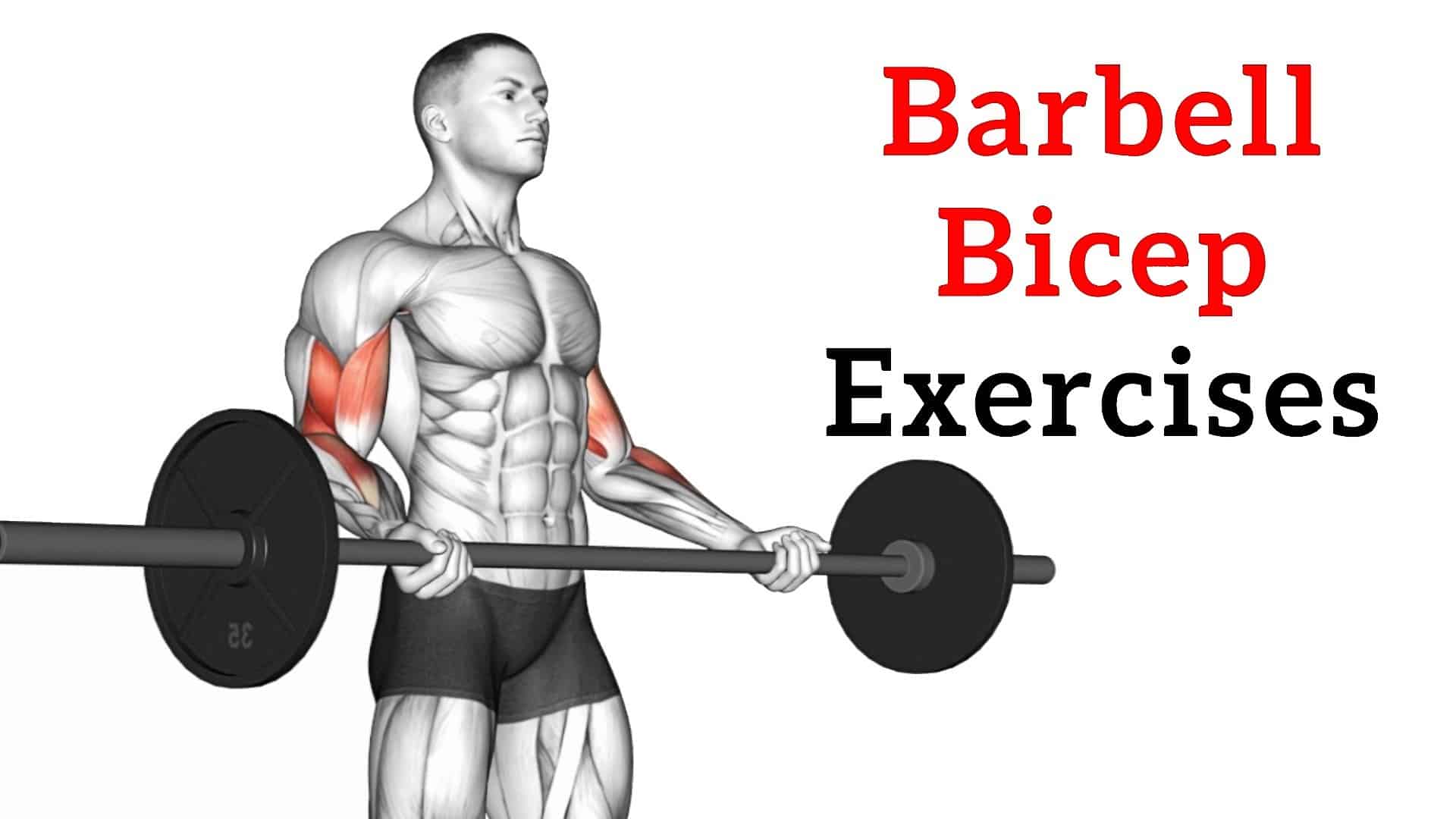
- Biceps Muscle (Anatomy)
- Best Barbell Bicep Exercises For Bigger Arms
- 1. Barbell Curl
- 2. Wide Grip Barbell Curl
- 3. Close Grip Barbell Curl
- 4. Barbell Preacher Curl
- 5. Barbell Spider Curl
- 6. Barbell Drag Curl
- 7. EZ Bar Curl
- 8. Wide Grip EZ Bar
- 9. Seated Barbell Concentration Curl
- 10. Barbell Reverse Curl
- 11. EZ Bar Reverse Curl
- 12. EZ Barbell Standing Preacher
- 10 Best Barbell Bicep Exercises That REALLY Work
- Barbell Biceps Training Tips (With Workout Plans)
- 1. Training Volume (Sets and Reps)
- 2. Use Different Wide Position
- 3. Mind-Muscle Connection
- 4. Progressive Overload
- 5. Rest and Recovery
- 6. Beginner Biceps Barbell Workout Plan
- 7. Intermediate Biceps Barbell Workout Plan
- 8. 25-Min Barbell Workout for Bicep Size
- Takeaways
Biceps Muscle (Anatomy)
You need to target the muscles from every angle to develop an impressive set of biceps. That’s right, we said muscles.
All the muscles that make up what most guys consider their biceps—the biceps brachii (long and short heads), as well as the Brachialis and brachioradialis (forearm)—must all receive some tough and exhausting love to achieve attention-grabbing guns?
The biceps brachii muscle (biceps) is a large, thick upper arm muscle. It has two heads: short (inner) and long (outer).
- The short head is located along the inner side of the anterior upper arm and the long head is located along the outer side of the anterior upper arm.
- The long head comprises most of the biceps’ peak, whereas the short head sits on the inner side and contributes to the width of the biceps.

Best Barbell Bicep Exercises For Bigger Arms
Before we get into the barbell biceps workout routines that you can follow, let’s see which individual exercises are the most effective for gaining muscle mass.
Here are 12 best Barbell Bicep Exercises to build bigger and stronger.
1. Barbell Curl
The barbell curl is a highly recognizable biceps exercise that builds biceps muscle mass and also trains the muscles in your forearms. It’s a great exercise for seeing results in strength and definition.
Personally, the barbell curl has been a staple in my bicep training for years.
You can typically lift more weight with a barbell, which means more stimulus for growth. Who doesn’t want that?
You can do the barbell curl with a wide and short grip to train the bicep from different angles.
- A wide grip focuses effort on the inner biceps (short head),
- whereas a narrow grip arks the outer biceps (long head).
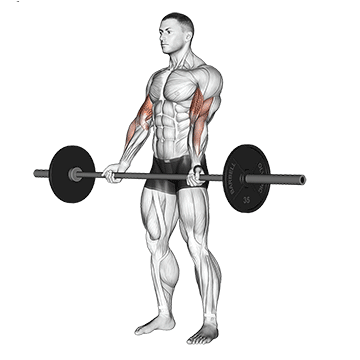
How To Do
- Stand with your feet shoulder-width apart.
- Hold a barbell at arm’s length, using a shoulder-width underhand grip.
- Keep your shoulders back and down, core engaged, and elbows tucked in by your sides.
- Keep your upper arms still (this is crucial—no swinging!), and curl the bar up towards your shoulders.
- Keep your shoulders back and down, core engaged, and elbows tucked in by your sides.
- Slowly lower the barbell back to the starting position.
Tips
- Don’t rush to load up the barbell. Begin with a weight you can comfortably control for 8-12 reps with perfect form.
- Your body should remain fixed. Only your biceps should be used to move the weight.
- It’s tempting to use a body swing to raise the weight, but resist the urge! This takes the focus off your biceps and can lead to injury.
2. Wide Grip Barbell Curl
During The Wide grip barbell curl, you have to grip the barbell wider than shoulder width, which targets the short head of the biceps. It also offers a range of benefits, including improved arm definition and grip strength.
Mixing this in with your regular curls keeps your muscles guessing and growing.
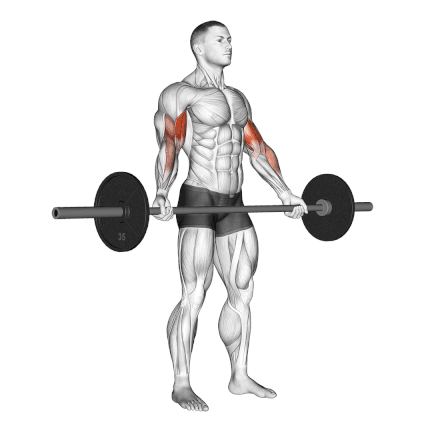
How To Do
- Grab that barbell with a wider-than-shoulder-width grip. Underhand, please!
- Stand tall, chest up, core tight. No leaning back.
- Keep your upper arms still while you curl the bar up.
- Squeeze at the top. Feel that peak contraction
- Slowly and carefully lower the barbell.
- Repeat for 8–12 reps. Feel the burn!
Tips
- The motion should occur at the elbow to isolate the biceps, not on the shoulders.
- One tip from my experience: don’t be discouraged if you can’t lift as heavy as you do with regular curls. It’s all about the quality of each rep, not the quantity.
3. Close Grip Barbell Curl
The close grip barbell curl targets the outer biceps (long head) of your biceps. It also engages the brachialis muscle and the brachioradialis muscle. This could contribute to a more balanced arm development.
If you feel any strain, use an EZ curl bar for a more comfortable grip.
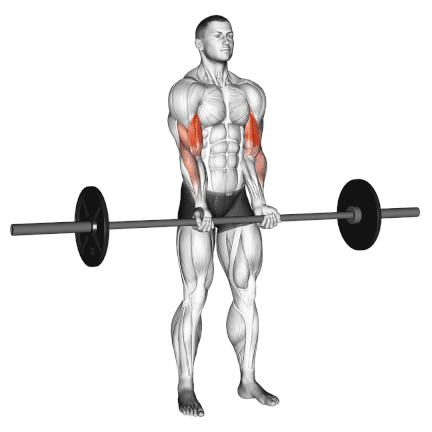
How To Do
- Stand with your feet shoulder-width apart.
- Grab that barbell with a grip about slightly narrower than shoulder-width
- Let the barbell hang in front of your thighs.
- Keep your elbows close to your sides and curl the barbell up towards your chest.
- Squeeze your biceps at the top of the movement.
- Then, slowly lower the barbell back down to the starting position.
Tips
- Your body should remain fixed. Only your biceps should be used to move the weight.
- Pause at the top of the movement and squeeze your biceps.
- The motion should occur at the elbow to isolate the biceps, not on the shoulders.
4. Barbell Preacher Curl
The Preacher curl is another great exercise for your barbell bicep workout. This time-tested bicep blaster stands out among the many bicep workouts.
This exercise is designed to isolate your biceps like no other. By resting your arms on the preacher curl pad, you eliminate any chance of cheating and force your biceps to do all the work. This intense isolation leads to maximum muscle fiber recruitment and serious growth potential.
The angle of the preacher bench provides a greater stretch at the bottom of the movement.
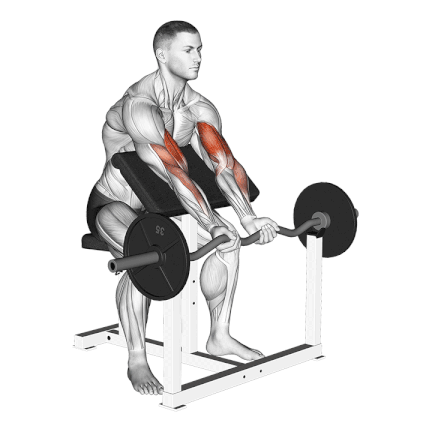
How To Do
- Adjust the preacher curl bench so that your armpits are comfortably resting on the top of the pad.
- Grab the barbell with an underhand grip (palms facing up) at shoulder-width or slightly wider.
- Curl the bar like a standard barbell curl and get the maximum contraction at the top.
- Lowering the bar slowly. This is where the magic again happens.
Tips
- Use a slow and controlled tempo, both during the lifting and lowering.
- Experiment with grip width. I found a shoulder-width grip that hits my biceps just right.
- It’s not just about lifting weights; you must feel each rep.
- Squeeze the biceps as hard as possible as you get the weight to the top.
5. Barbell Spider Curl
If you’re looking for a way to get more creative with your barbell biceps workout, why not try the barbell Spider Curl?
Barbell spider curls train your biceps in a shortened (that is, maximally contracted) muscle position. This results in a powerful muscle pump that makes your arms appear more vascular and can also lead to significant hypertrophy.
Spider bicep curls are typically done with a barbell. However, you can also use an EZ bar or dumbbells.
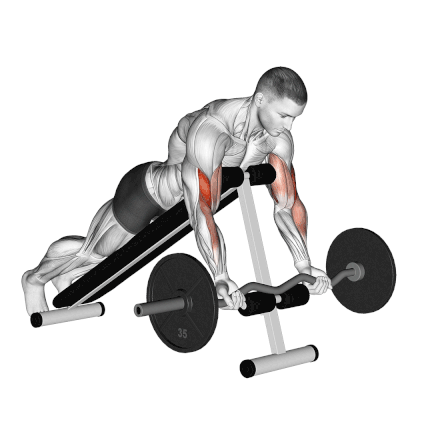
How To Do
- Adjust the bench to an incline and level to a 45-degree angle. Lean against the bench so that your chest is supported.
- Stand on the balls of your feet and keep them about shoulder width apart for stability.
- Let your arms hang in front of your torso. From here, prepare a barbell or set it up in front of you.
- Slowly curl the barbell toward your shoulders and squeeze your biceps forcefully.
- Then, slowly lower the bar under control until your elbows are fully extended.
6. Barbell Drag Curl
This barbell exercise is another great option that will help you to target the biceps and grow your arms. While less popular than the standard barbell bicep curl exercises, the barbell drag curl is an extremely effective bicep exercise.
It is performed by holding a barbell close to the body, dragging and curling it towards the shoulder in a smooth, controlled motion.
If you want to improve your arm size, strength, and appearance, the barbell drag curl is for you.
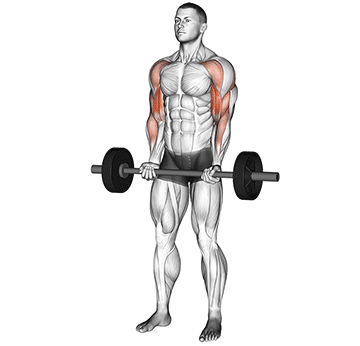
How To Do
- Stand with your feet shoulder-width apart, your knees slightly bent, and your abs are drawn in.
- Grab the barbell with a double underhand (supinated) grip with your hands slightly wider than shoulder-width apart
- Bring your elbows and shoulders back slightly as you curl the barbell upwards. It should feel like you are “dragging” the barbell up to your body.
- Squeeze your biceps hard at the top and slowly return to the starting position.
Tips
- Perform this exercise in a slow, controlled manner for best results.
- Keep your elbow back to keep the stress on your biceps.
- Maintain a slight bend in the elbow at the bottom of the movement to keep tension through the biceps.
7. EZ Bar Curl
The EZ bar is a curved barbell that has a more ergonomic grip than a straight barbell. This makes it a more comfortable exercise to perform, especially for people with wrist pain.
The straight bar version of this exercise is excellent too. However, it can cause wrist and forearm discomfort for many lifters due to the need for a fully supinated grip.
Due to the semi-pronated grip, there’s a slightly increased engagement of the brachioradialis in the forearm.
Note: In the study conducted, they found that the EZ barbell curl showed the highest overall electromyography (EMG) activity in the biceps brachii (BB) and brachioradialis (BR) muscles compared to the dumbbell curl (DC) and barbell curl (BC) variants.
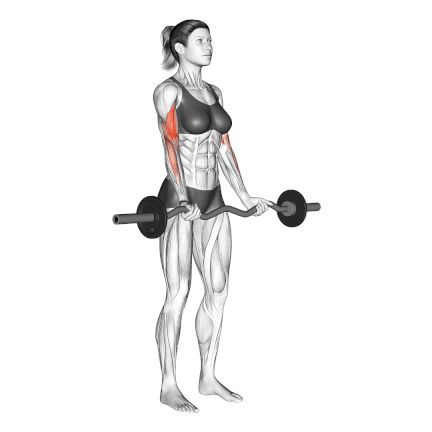
How To Do
- Stand holding an EZ-curl bar using a close, supinated grip (hands closer than shoulder width apart and palms facing upward). Let the bar rest on your thighs.
- Keeping your elbows fixed to your sides, exhale as you curl the EZ-curl bar up toward your shoulders.
- Hold for a count of two and squeeze your biceps.
- Inhale as you lower the EZ-curl bar to the starting position.
Tips
- Keep your elbows locked to your sides and your body still. Only your forearms should move.
- The motion should occur at the elbow to isolate the biceps, not on the shoulders.
8. Wide Grip EZ Bar
If you want to target your inner biceps, then this is a great exercise for you. Here, you can focus on the short head as your hands are wider to each other during the movement.
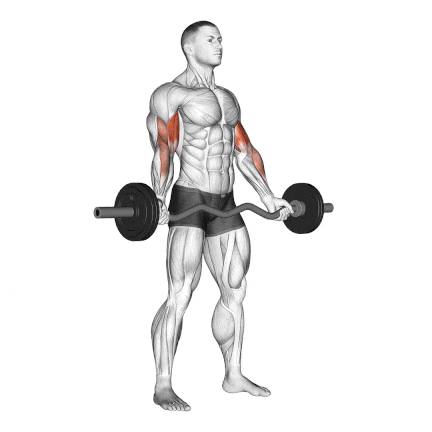
How To Do
- Stand holding an EZ-curl bar using a wide supinated grip (hands wider than shoulder-width apart, palms facing upward). Let the bar rest on your thighs.
- Keeping your elbows fixed to your sides, exhale as you curl the EZ-curl bar up toward your shoulders.
- Hold for a count of two and squeeze your biceps.
- Inhale as you lower the EZ-curl bar to the starting position.
- Repeat for the desired number of repetitions.
Tips
- Keep your elbows locked to your sides and your body still. Only your forearms should move.
- Pause at the top of the movement and squeeze your biceps.
- The motion should occur at the elbow to isolate the biceps, not on the shoulders.
9. Seated Barbell Concentration Curl
This barbell biceps exercise can be performed standing with the torso bent forward and the arm in front of you.
In this case, no leg support is used for the back of your arm, so you will need to make extra effort to ensure no movement of the upper arms.
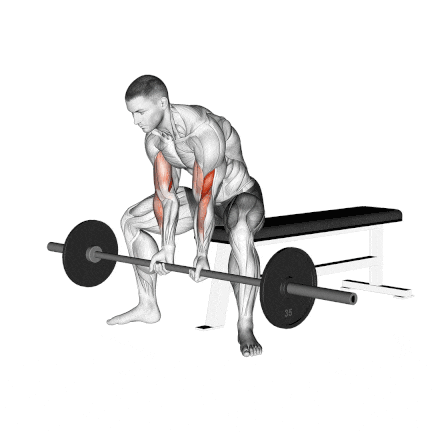
How To Do
- Sit down on a flat bench with a barbell or E-Z Bar in front of you in between your legs.
- Use your arms to pick the barbell up and place the back of your upper arms on top of your inner thighs.
- A supinated grip closer than shoulder width is needed to perform this exercise.
- Your arm should be extended at arm’s length and the barbell should be above the floor. This will be your starting position.
- Curl the weights forward while contracting the biceps as you breathe out. Continue the movement until your biceps are fully contracted.
- Slowly bring the barbell back to the starting position as you breathe in.
10. Barbell Reverse Curl
The barbell reverse curl is a non-negotiable component of arms training. A standard barbell curl will still work the same muscles, but a reverse curl variation hits certain muscles a little better.
While the standard curl primarily targets the biceps brachii, the reverse curl shifts the emphasis to other forearm and arm muscles, thanks to the overhand (pronated) grip.
The pronated grip helps strengthen the wrist muscles by engaging the wrist extensors.
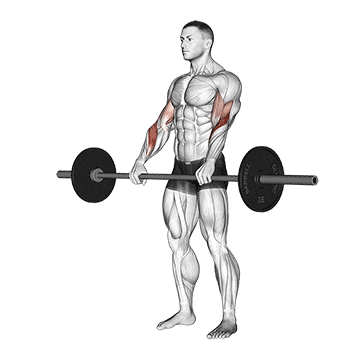
How To Do
- Grab the bar with a shoulder-width grip, with your hands on top of the bar (pronated grip).
- Ensure that your elbows are kept close to your sides.
- Curl the bar up to shoulder level by bending your elbows.
- Lower the bar back down to the extended position of the arms.
11. EZ Bar Reverse Curl
The EZ bar tends to be much more comfortable for trainees, allowing them to use heavier loads. This is because their grips are slightly more neutral, meaning the wrists have less stress.
At the same time, they are still pronated enough to really target the brachialis.
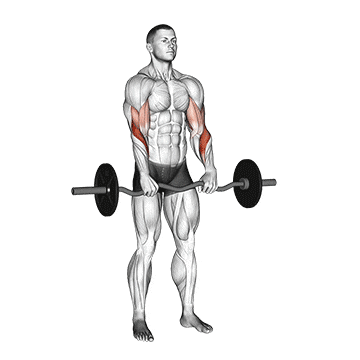
How To Do
- Grab an EZ-Bar and place your hands on the angled grip.
- Keeping your elbows in, bring the bar up to your chest by flexing the elbow.
- Your body should remain fixed. Only your biceps should be used to move the weight.
- Pause at the top of the movement and squeeze your biceps.
- Lower the bar back down to the arms’ extended position.
12. EZ Barbell Standing Preacher
Finally, try the standing preacher curl if you’re looking for one more effective barbell bicep exercise.
The body should be positioned so that the armpit rests near the top of the pad. The back of the upper arm should remain on the pad throughout movement.

How To Do
- Standing with a staggered stance close to the preacher’s curl bench.
- Grab the barbell or EZ bar by placing the back of your upper arms on the preacher bench pad.
- Curl the EZ bar until it reaches your shoulder level and gets maximum contraction at the top.
- Hold the position for 1–3 seconds and lower the bar so that your arms are again fully extended.
- Keep the motion slow and controlled throughout the set.
10 Best Barbell Bicep Exercises That REALLY Work
Barbell Biceps Training Tips (With Workout Plans)
The barbell exercises allow you to lift heavy weights to target and overload the biceps muscles directly. Performing curls with a barbell enables you to work the biceps through a full range of motion while using multiple grips to focus on different muscle parts.
1. Training Volume (Sets and Reps)
Of course, the number of sets and reps will be determined based on your fitness journey, but here is a great starting point:
Sets
- Beginners: ~10 sets per week
- Intermediate: ~15 sets per week.
- Advanced: ~20 sets per week.
When a certain amount of volume stops being effective and your progress stalls, you can add sets to increase volume and use that as a driver of renewed progress.
Reps
To build bigger, stronger biceps with barbells, adjust your rep ranges and weights based on your goals:
- For strength gains, perform 1-6 reps per exercise, using a weight that’s at least 85% of your 1 rep max. Go as heavy as possible.
- For muscle growth, do 8-12 reps with a weight that’s 70-85% of your 1RM.
- For muscular endurance, opt for lighter loads at 50-70% 1RM and higher reps in the 15-20 range.
2. Use Different Wide Position
By changing your hand positioning on the bar, you can alter which area of the biceps is emphasized during curls. For example, a narrow grip hits the outer bicep head more. A wide grip stresses the inner bicep head.
Incorporate different curl variations, such as standard curls, reverse curls, and hammer curls, into your barbell routine to hit the biceps from all angles and increase mass and strength across the biceps.
3. Mind-Muscle Connection
Focus on the biceps as you perform the movement. Think about the muscle contracting and lengthening. This conscious effort can significantly improve muscle activation.
4. Progressive Overload
Over time, gradually increase the weight you’re lifting to continue challenging the muscles and promote growth. This doesn’t always mean adding weight; it could be increasing reps or adding more sets.
5. Rest and Recovery
Like any other muscle group, the biceps need time to recover and grow. Ensure you’re giving them adequate rest and not overtraining.
Pair your workouts with proper nutrition. Consuming protein-rich meals or shakes post-workout can aid muscle recovery and growth.
6. Beginner Biceps Barbell Workout Plan
Whether you want to develop strength, hypertrophy, or endurance, these workout plans will help you effectively train your biceps.
| Exercise | Sets | Reps |
|---|---|---|
| EZ Bar Reverse Curl | 4 | 8-10 |
| Barbell Curl | 4 | 6-8 |
| Preacher Curl | 3 | 8-12 |
7. Intermediate Biceps Barbell Workout Plan
| Exercise | Sets | Reps |
|---|---|---|
| EZ Bar Curl | 4 | 8-10 |
| Wide Grip Barbell Curl | 3 | 6-8 |
| Barbell Spider Curl | 3 | 8-12 |
| Barbell Reverse Curl | 4 | 8-10 |
8. 25-Min Barbell Workout for Bicep Size
| Phase | Exercise/Activity | Sets | Reps/Duration | Rest |
|---|---|---|---|---|
| Warm-Up | Arm swings | – | 30 seconds | – |
| Jumping jacks | – | 1 minute | – | |
| Dynamic wrist stretches | – | 30 seconds | – | |
| Workout Routine | Barbell Curl (Standard grip) | 4 | 8-10 | 60 sec |
| Barbell Preacher Curl | 4 | 6-8 | 60 sec | |
| EZ Bar Reverse Curl | 3 | 8-10 | 60 sec | |
| Barbell Drag Curl | 3 | 8 | 60 sec | |
| Cool Down | Static bicep stretch | – | 30 seconds (each arm) | – |
Takeaways
Barbells allow you to lift heavier loads than dumbbells and highly activate the biceps heads. With regular practice, barbell biceps exercises can help you achieve greater biceps development.
Barbell curls, EZ bar curls, concentration curls with a barbell, barbell preacher curls, and barbell reverse curls are some of the best examples of biceps exercises.
You must also combine barbell exercises with cable and dumbbell exercises to add more variations to your training.
References:
- Caufriez B, Dugailly PM, Brassinne E, Schuind F. The Role of the Muscle Brachioradialis in Elbow Flexion: An Electromyographic Study. The Journal of Hand Surgery (Asian-Pacific Volume). doi:https://doi.org/10.1142/s2424835518500145
- García-López, David1; Herrero, Azael J1,2; González-Calvo, Gustavo1; Rhea, Matthew R3; Marín, Pedro J1,2. Influence of “In Series” Elastic Resistance on Muscular Performance During a Biceps-curl Set on the Cable Machine. Journal of Strength and Conditioning Research 24(9):p 2449-2455, September 2010. | DOI: 10.1519/JSC.0b013e3181e3482f
- Melrose, Don PhD, CSCS*D. Exercise Technique: The Zottman Curl. Strength and Conditioning Journal 36(1):p 92-93, February 2014. | DOI: 10.1519/SSC.0b013e318297a092

Manish is a NASM-certified fitness and nutrition coach with over 10 years of experience in weight lifting and fat loss fitness coaching. He specializes in gym-based training and has a lot of knowledge about exercise, lifting technique, biomechanics, and more.
Through “Fit Life Regime,” he generously shares the insights he’s gained over a decade in the field. His goal is to equip others with the knowledge to start their own fitness journey.
